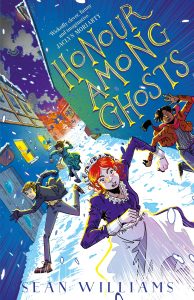
Ask a Writer: Sean Williams on writing
 Sean Williams is the author of over fifty novels. He has been on the New York Times Best Seller lists, won awards and is very successful all round. His latest books have been reviewed here: Her Perilous Mansions and Honour Among Ghosts.
Sean Williams is the author of over fifty novels. He has been on the New York Times Best Seller lists, won awards and is very successful all round. His latest books have been reviewed here: Her Perilous Mansions and Honour Among Ghosts.
He has written many articles about the craft of writing and here are three of them that give an insight into how he views his work.
10 and a half commandments of writing :Every author is asked by new writers for advice. There is, however, no all-encompassing, single answer that also happens to be correct. Quite a lot of commonly offered suggestions (“write every day”) don’t work for everyone and must be approached with caution. A few years ago, I set out to create a list that will benefit all new writers. I put ten commandments through the wringer of my peers, who suggested modifications and noted that this list applies not just to new writers but to writers at every stage of their career. Indeed, I’ve needed reminding of more than one myself. Here, then, are the 10½ commandments of writing – with an extra one for free.
Collaboration made easy: Six ways to build a writing relationship: Writing is a pastime best conducted on your own — or so common wisdom would have it. Yet writing teams exist, and in many realms they are expected. In my experience, collaborating can be creatively stimulating, educative, motivating, productive, and revitalising. Plus, it’s great to have a friend to keep you company on a publicity tour. Here are six techniques to help would-be co-writers take their first steps in this direction.F
Humour, justice, belonging, danger, and wonder: 5 story senses and the art of writing for children. At the heart of every adult writer lies a novel they adored as a child. No wonder then so many try to write for kids themselves. So why do they often fail? Perhaps it’s because, on the whole, adults are taught to write for adults, utilising the full power of the five regular senses – sight, sound, touch, taste, and smell – to evoke meaning in even the most trivial of everyday events. This approach is less successful with younger readers, for one very simple reason: there are five other senses that speak more potently to them. Consciously or unconsciously, successful writers use these other senses to hook young readers (and open their parents’ wallets) in ways that seem almost magical.






